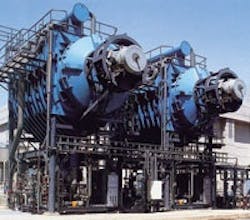About the author: Yaniv Schmidt is industrial water solutions marketing manager, IDE Technologies Ltd. Schmidt can be reached at [email protected].
In a world of heightened environmental awareness, spiraling costs and shrinking resources, an increasing number of water-dependent industries are deploying advanced water treatment systems to enhance their profitability while improving the reliability and sustainability of their operations.
Through the use of membrane and thermal technologies, industries as divergent as oil and gas field production, coal power generation, oil refining, mining and others are using today’s industrial water treatment systems to bring a new level of efficiency to their influent, cooling, boiler and wastewater operations, delivering a host of benefits, including:
- Dramatic increase in the reuse of produced water, resulting in a significant reduction in water costs while minimizing the consumption of freshwater sources;
- Significant reduction in energy consumption by enabling the reuse of steam, thereby fully utilizing generated heat. The best water treatment systems have been shown to reduce energy consumption by up to 20%;
- Maximized performance and reliability of boiler systems by improving the quality of feed water and preventing scale and fouling;
- Reduction in operating costs through the deployment of automated or mostly automated systems that use no chemicals and that have minimal ongoing operational and maintenance requirements;
- Dramatic reduction of steam emissions and polluting effluents, thereby enabling the operations to comply with ever-strengthening regulations—even achieving zero liquid discharge; and
- Advanced water treatment systems can be deployed in all stages of water treatment, from the pretreatment stage through thermal/membrane processing and post-treatment.
From the Field
In the oil and gas industry, produced water treatment and recovery solutions are essential for onshore conventional and enhanced oil production, such as steam-assisted gravity drainage (SAGD) and gas fracking production processes, such as coal seam gas. In these highly water-intensive operations, treatment solutions enable a high (up to 90%) proportion of water reuse, minimizing discharge volumes and improving control over reservoir pressures.
Thermal evaporation and concentration technologies have proven to be a robust and effective method for treating deoiled produced water in SAGD production. They provide high-quality distillate for steam generation with the flexibility to work with either once-through steam generators or industrial water tube boilers.
For example, in the past 20 years, Wintershall, Germany’s largest crude oil and natural gas producer, has been using IDE mechanical vapor compression (MVC) systems at its Emlichheim Oil Field to enable an enhanced SAGD oil recovery process.
Prior to installing the systems, Wintershall produced the system’s water via a conventional steam injection method that consumed external groundwater, a resource-intensive method that created undesirable pressure within the reservoir and posed an environmental threat to local water sources. Wintershall sought an alternative system based on a closed water treatment loop that could enable higher levels of oil production without over-pressuring the reservoir, while also avoiding contamination changes to surrounding water sources.
Using unique horizontal units designed specifically for challenging water conditions, the MVC units produce 1,200 cu meters of water per day from the wastewater recovered from the SAGD process, and uses this water to produce steam for ongoing operations. Through this closed cycle process, Wintershall has been able to achieve a consistently high rate of production without exceeding reservoir pressure limits, thereby securing the success of its future oil exploration activities.
“IDE’s evaporators have operated at 98% availability for the last 20 years, allowing for maximum oil production via a truly sustainable water treatment solution,” said Ludger Lau, plant operational engineering & technology, Wintershall.
In the coal power industry, water treatment technologies are used in cooling tower blowdown treatment and recycling systems to reduce make-up water requirements and the volume of rejected effluents for achieving zero liquid discharge requirements.
For example, for 25 years, Eskom’s Tutuka electricity generation plant in South Africa has used MVC concentrators to recover 90% of the water used in the generation process, significantly reducing produced water volume while recovering water for reuse.
Eskom sought a cost-effective, environmentally friendly solution for reducing cooling water blowdown and creating high-purity water for boiler use. It deployed two MVC concentrators to treat a total of 1,420 cu meters of water per day, representing 90% of total water used in the electricity generation process. As a result, Eskom was able to dramatically decrease the volume of produced water of which it had to dispose, while also improving the plant’s overall environmental impact.
“The successful operation of the plant for over 25 years has proven IDE’s reliability and technological leadership, as well as its eco-friendly approach,” said Mike van der Walt, auxiliary plant engineering manager, Tutuka Power Station.
Advanced water treatment technologies are being used increasingly in the mining industry for both inlet and outlet water treatment and reuse. For example, the CITIC Pacific Mining Sino Iron project in Cape Preston, Australia, has contracted with IDE to design, engineer and consult on the construction of a 140,000-cu-meter-per-day reverse osmosis desalination plant. The plant’s design will enable it to operate efficiently despite exceptionally challenging local water conditions, providing the copious high-quality freshwater needed both for the mining operations and for consumption by local miners in this remote region.
Forward Thinking Pays Off
These are just a few examples of ways that industry can deploy advanced water treatment technologies to bring a new level of efficiency, robustness and environmental responsibility to operations of all sorts. Continuous improvements in the areas of operating efficiency, modularity and customization are enabling these systems to be installed and commissioned with minimal time and expense, generating an almost immediate reduction in costs that only becomes more apparent over time.
Download: Here
